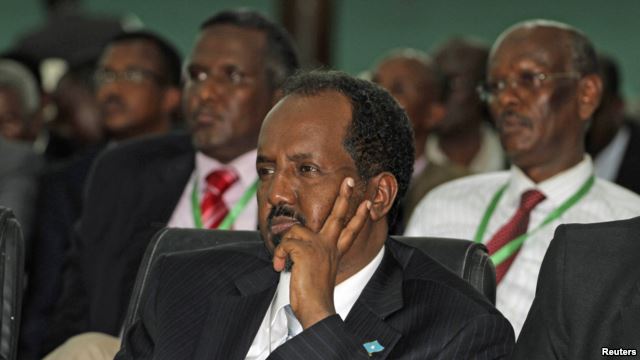
Muqdisho | VOA | by Harun Maruf | The Somali parliament approved amendments to the constitution Wednesday that will allow the House to continue to function should the country’s leaders fail to meet the deadline set for the election of government institutions.
The parliament’s move fuels anxiety that legislative elections scheduled for August and presidential polling set for September may not take place. The Somali leaders are already behind schedule for agreeing on details of the election procedures, the status of Mogadishu (whether it will be a capital or a federal state), and constitutional amendments that allow government institutions to function beyond the end of their current mandate.
Matt Bryden, director of Sahan Research and a leading regional analyst, said the leaders can still hold the elections on time to maintain the existence of the internationally recognized government institutions in the country.
“It is still possible to hold an electoral process in Somalia whether or not that happens is going to be a question of political will on the part of the various actors concerned,” he said. “I think we have seen the federal government, the president, the prime minister and leaders of the federal member states committed to taking the electoral process forward. Parts of the parliament has objected to the process as its taking shape, they objected the lead role of the National Leadership Forum “NLF”, and I think we could anticipate attempt by some MPs to interfere with process,” he said.
Bryden warned against delaying the elections or an extension as feared by many ordinary citizens. Some of the leaders though are privately accepting that there will be delays due to “technicalities”.
“Missing the deadline and moving into the dynamic of a delay of an extension of any kind is extremely risky. It could trigger a political crisis, it could trigger a constitutional crisis,” he said.

“Beyond those dates there are opportunities for contestation to emerge for spoilers or even legitimate opposition to claim that the institutions are no longer legitimate. I think that is a risk that Somalia does not need to take,” he said.
Earlier this year the leaders of the federal government and the heads of regional administrations, known as NLF, agreed that direct elections to be held in the country were not feasible this year, as promised four years ago. Instead, the leaders agreed to hold indirect elections. They have agreed that more than 14,000 delegates will elect the 275-member lower house of parliament and that regional administrations will directly nominate the 54-member upper house. The two houses will elect a president.
Somali leaders are again promising another one-person, one-vote system in 2020. Bryden said the current process is unconstitutional but added there is no other option. He said it will only improve current institutions.
“For the first time the federal states or the interim regional admins will have representatives in the federal institutions, will participate in the legislative process, will be involved in the setting up of the transitional mechanism, and I think we are likely to see a much better relationship and cooperative relationship between the federal member states and the federal government in the next four years if this process is allowed to go forward.”
The government accepts it was unable to hold popular elections primarily because of the security challenges with the radical Islamist group al-Shabab still controlling vast land in the countryside and continuously launching ambushes against government and African Union peacekeeper supply lines. Bryden said al-Shabab is not the only problem.
“No, al-Shabab is not the problem. The elephant in the room I would say is not al-Shabab, it’s the failure of the government to exercise effective authority across Somalia’s territory, and al-Shabab is not the greatest impediment, the greatest impediment is the lack of capacity, it’s the failure to practice fully inclusive politics,” he said.
“Al-Shabab is disruptive but it’s no longer an existential threat to Somalia or to the States of the region but it thrives on local grievances, and it’s those grievance that the government has to work on reducing or eliminating if it’s effectively going to counter Al-Shabab,” he said.

The Somali government says al-Shabab is more than disruptive and blames the group for almost most of the problems in the country. When VOA recently asked the Somali prime minister if he supports drone strikes against the group’s leaders, Omar Abddirashid Sharmarke said the group is responsible for not only the security challenges but also for driving the Somali youth in despair.
“What brought this problem is al-Shabab, we would have moved on from 25 years of troubles, our kids are dying in the seas,” he said.
“The problem was brought by the people who are committing suicide against hotels who are behind this radical ideology that is massacring the Somali people that is preventing the country from development and peace and our children to go to schools.”
Sharmarke said al-Shabab brought the drones upon itself.
“We would not have needed foreigners, blame lies with the people who are against peace,” said Sharmarke.
_____________________________________________________________________________________
Xafiiska Wararka Qaranimo Online | Mogadishu, Somalia
_____________________________________________________________________________________Advertisement
_____________________________________________________________________________________







